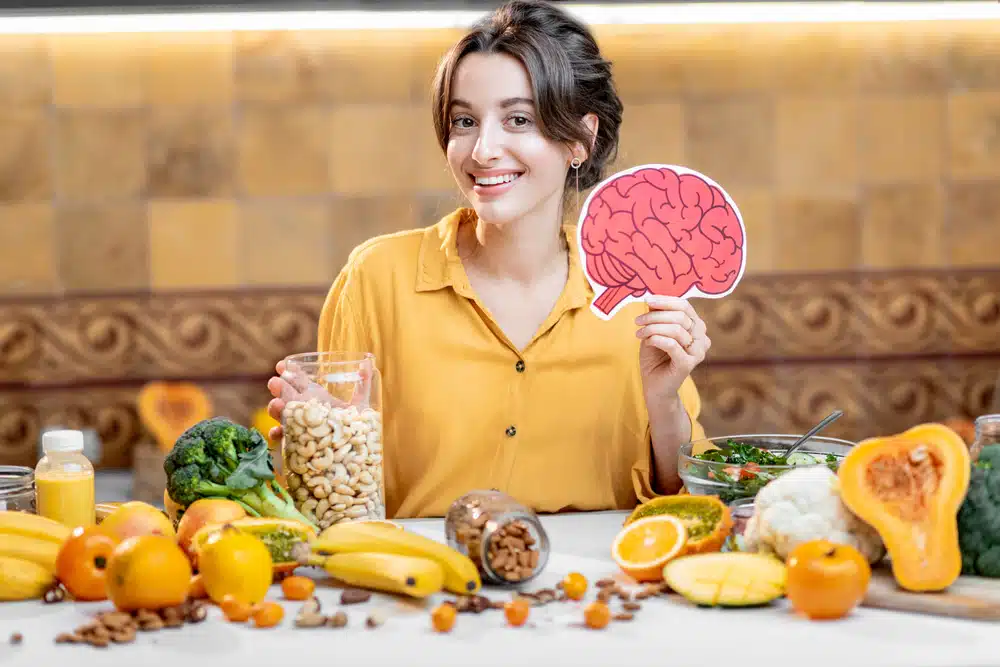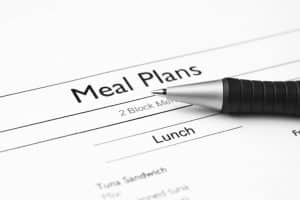Brain Food for Exam Day: What to Eat to Stay Alert and Focused
Maintaining a healthy diet can be challenging for a student, especially during busy exam periods. However, the right foods can significantly impact cognitive function and academic performance. Brain food is essential for students, especially on exam days when mental performance is crucial.
In this post, we will explore the top brain foods students should incorporate into their diets to stay alert and focused during exams. We will discuss the importance of breakfast and healthy snacking, the role of hydration in optimal brain function, and the benefits of mindful eating. By following these tips, students can improve their academic performance and health during exams.
What is brain food?
What is brain food? Brain food refers to foods beneficial for cognitive function, focus, and memory retention. These foods are typically rich in important nutrients for brain health, such as omega-3 fatty acids, antioxidants, vitamins, and minerals. Examples of brain food include fruits and vegetables, whole grains, nuts and seeds, fatty fish, lean proteins, and low-fat dairy products.
Consuming brain food can help improve cognitive function, boost mood, reduce stress, and increase energy levels. Students need to prioritize brain food on exam day to ensure they have the energy and focus they need to perform at their best.
The importance of breakfast on exam day
Breakfast is often called the most important meal of the day, especially for students on exam day. Eating a healthy breakfast can provide sustained energy and help students stay focused throughout the day. When we sleep, our bodies use energy, and breakfast helps replenish that energy so we can start the day off strong.
Additionally, breakfast provides essential nutrients and vitamins that our bodies need to function properly. Skipping breakfast can lead to fatigue, hunger, and decreased cognitive function, making focusing harder during exams.
A balanced breakfast should include protein, fiber, and complex carbohydrates. Protein provides sustained energy and helps keep us feeling full, while fiber and complex carbohydrates help regulate blood sugar levels. Some healthy breakfast options include oatmeal with fruit and nuts, whole grain toast with avocado and eggs, or a smoothie with spinach, berries, and yogurt.
By starting the day with a healthy breakfast, students can give themselves the energy and focus they need to perform at their best during exams.
Snack smart for sustained energy
Snacking throughout the day can be important for students to maintain their energy levels and prevent crashes during long study sessions and exams. When we go for long periods without eating, our blood sugar levels can drop, leading to fatigue and decreased cognitive function. Snacking can help to regulate blood sugar levels and provide a steady stream of energy to the body and brain. Additionally, snacking can help prevent overeating at meal times by keeping hunger levels in check. Choosing healthy snacks high in protein, healthy fats, and fiber is important, as is avoiding sugary snacks that can lead to energy crashes and decreased focus.
Top brain foods for students
Many healthy snack options are high in protein, healthy fats, and fiber, making them ideal choices for students during exams. Here are some examples:
- Nuts and Seeds: Almonds, walnuts, pumpkin seeds, and sunflower seeds are all rich in protein and healthy fats. They’re also a good source of fiber, making them a satisfying and filling snack.
- Fruit: Apples, bananas, oranges, and berries are all great snack options that are high in fiber and provide a natural energy source. They’re also packed with vitamins and minerals, making them a healthy choice for students.
- Greek yogurt: Greek yogurt is high in protein and can be a satisfying snack that keeps hunger at bay. Adding fruit or nuts to the yogurt can make it even more filling.
- Hummus: Hummus is a healthy dip made from chickpeas and olive oil. It’s high in protein and healthy fats, making it a great snack option when paired with veggies or whole-grain crackers.
- Hard-boiled eggs: Hard-boiled eggs are easy and portable snacks high in protein and healthy fats. They’re also a good source of vitamins and minerals, making them a healthy choice for students.
- Avocado: Avocado is a delicious and nutritious snack high in healthy fats, fiber, and essential vitamins and minerals. It can be consumed on its own or added to toast or salad for a more substantial snack.
- Edamame: Edamame is a great snack option that is high in protein and fiber. These little green beans are packed with vitamins and minerals and can be boiled and seasoned for a tasty and filling snack.
- Trail mix: Trail mix is a perfect snack for students on the go. It’s a mix of nuts, seeds, and dried fruits that provides a healthy balance of protein, healthy fats, and fiber. It’s also easy to pack and carry in a small container or bag.
- Cottage cheese: Cottage cheese is a great snack option that is high in protein and low in calories. It’s a versatile snack paired with fruit, veggies, or whole-grain crackers for a more filling snack.
- Roasted chickpeas: Roasted chickpeas are a tasty and crunchy snack high in protein and fiber. They’re easy to make at home and can be seasoned with a variety of spices for a flavorful snack.
Students can maintain their energy levels and prevent crashes during long study sessions and exams by choosing healthy snack options high in protein, healthy fats, and fiber. These brain food snacks also provide important nutrients and vitamins essential for maintaining cognitive function and overall health. By incorporating brain food snacks into their daily routine, students can fuel their bodies with the necessary nutrients to support optimal brain function and focus.
How to avoid unhealthy snacks?
It’s important for students to avoid unhealthy snacks that are high in sugar and empty calories, as these can lead to energy crashes and decreased focus. Here are some tips for avoiding these types of snacks:
- Read labels: When shopping for snacks, be sure to read the labels to see what ingredients are included. Avoid snacks with added sugars or high in saturated or trans fats.
- Be mindful of portion sizes: Even healthy snacks can be high in calories if eaten in large amounts. Pay attention to portion sizes and avoid mindlessly snacking throughout the day.
- Plan ahead: Planning and preparing healthy snacks in advance can help students avoid reaching for unhealthy options when hunger strikes. Keep a stash of healthy snacks in your backpack or desk drawer so you always have a healthy option on hand.
- Choose whole foods: Whole foods, such as fruits, veggies, nuts, and seeds, are naturally high in fiber and nutrients, making them a healthy snack option. Avoid processed foods, which are often high in sugar and empty calories.
- Avoid sugary drinks: Sugary drinks, such as soda and energy drinks, can lead to energy crashes and decreased focus. Instead, opt for water, herbal tea, or unsweetened drinks to stay hydrated throughout the day.
Hydration for optimal brain function
Hydration and brain food are both essential for optimal brain function, and students must prioritize both on exam day. Our brains are made up of 75% water, and even mild dehydration can lead to fatigue, headaches, and decreased cognitive function. When we’re dehydrated, our blood volume decreases, which means less oxygen and nutrients are delivered to the brain, making it harder to concentrate and focus.
Studies have shown that even mild dehydration can impair short-term memory, attention, and reaction time, making it harder to perform well on exams.
To stay hydrated throughout the day, students should aim to drink water regularly and avoid sugary drinks and caffeine, which can lead to dehydration. Drinking water is the best way to stay hydrated, and drinking enough water throughout the day is important to replace fluids lost through sweat and urination. A good rule of thumb is to drink at least eight glasses of water per day or more, if you’re active or in a hot environment.
In addition to water, eating fruits and vegetables that are high in water content can also help with hydration. Cucumbers, watermelons, strawberries, and oranges are all great choices. Avoid sugary drinks and caffeine, which lead to dehydration and energy crashes. If you choose to drink caffeine, be sure to drink water to help counteract its dehydrating effects.
To help students stay hydrated on exam day, it’s a good idea to bring a water bottle to the exam and take regular sips throughout. It’s also important to start the day with a glass of water and drink water throughout the day, even if you don’t feel thirsty. By staying hydrated, students can help ensure optimal brain function and perform at their best during exams.
Mindful eating for better focus
Mindful eating is the practice of paying attention to the eating experience, including the taste, texture, and sensation of food. This practice helps individuals to become more aware of their hunger and fullness cues and to make more conscious choices about what they eat. For students, mindful eating can be a helpful tool to stay focused and alert during exams.
When we eat mindfully, we not only pay attention to the taste and texture of the food, but we also consider the nutritional value of what we’re eating. This means incorporating brain food into our meals and snacks, which are rich in nutrients and vitamins essential for cognitive function. By paying attention to how food makes us feel, we can also make better choices about what we eat, choosing foods that provide sustained energy and help us feel alert and focused.
During exams, it can be tempting to snack on unhealthy foods or to skip meals altogether, but mindful eating can help students make better choices about what they eat. By taking a few moments to pause and pay attention to their hunger and fullness cues, students can make more conscious choices about what they eat, choosing foods that provide sustained energy and focus.
To practice mindful eating, students can start by taking a few deep breaths before eating and then paying attention to the taste, texture, and sensation of their food. They can also tune in to their hunger and fullness cues, eating when they’re hungry and stopping when they’re full. By practicing mindful eating, students can improve their relationship with food and make better choices about what they eat, helping them to stay focused and alert during exams.
Conclusion
In conclusion, this post has discussed the importance of brain food for students on exam day. We have highlighted the significance of starting the day with a healthy and balanced breakfast, snacking throughout the day to maintain energy levels, and avoiding unhealthy snacks that are high in sugar and empty calories.
We have also discussed the importance of hydration for optimal brain function and the concept of mindful eating as a tool to stay focused and alert during exams.
It’s clear that brain food is critical for students to perform their best during exams. Students can maintain their energy levels, improve their cognitive function, and reduce stress by prioritizing healthy foods and snacks, staying hydrated, and practicing mindful eating.
We encourage students to incorporate these tips into their daily routines to improve their academic performance and overall health. By making small changes to their diet and hydration habits, students can set themselves up for success and perform their best during exams. Remember to prioritize brain food, hydrate regularly, and practice mindful eating to stay focused and alert during exams.
Having all the necessary information is important before choosing any course of action. AdmissionSight is always here to assist you with any questions or concerns. We have more than ten years of expertise assisting students in successfully navigating the challenging admissions process.
Consult with AdmissionSight and find out what we can do to help you get into the school of your choice by ensuring that you are sufficiently aware and well-prepared for the application process.








































